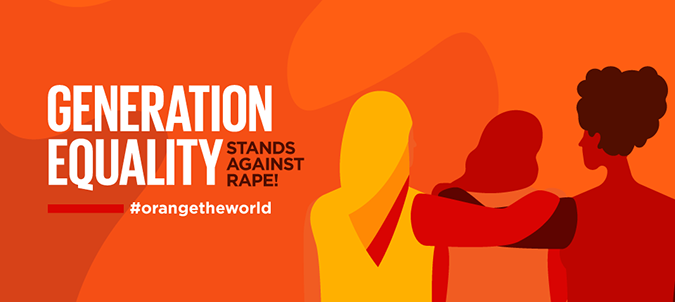Generation Equality stands against Rape!
Date:

In the Latin America and the Caribbean region, 1.1 million adolescent girls ages 15 to 19 have experienced sexual violence or have been forced into a sexual act, and at least 1 out of 3 women has experienced physical and/or sexual violence at some point in her life. Rape has a devastating impact on the lives of women. It has an impact on their health and wellbeing and limits their fundamental rights, as well as their life opportunities.
This year, within the context of the 16 days of activism against gender-based violence, which run from 25 November to 10 December, UN Women is joining the campaign, whose theme is "Generation Equality Stands against Rape!".
Child, early and forced marriages and unions increase the likelihood of experiencing sexual violence. In the Latin America and the Caribbean region, 1 out of 4 young women were first married or in union before the age of 18. Sexual violence is also closely related to high adolescent pregnancy rates. One third of the total number of pregnancies in the region corresponds to girls under the age of 18, and almost 20% of them to girls under the age of 15.
While in recent years survivors and activists have raised their voices to denounce and condemn rape and other forms of sexual violence through movements such as #MeToo, #TimesUp, #Niunamenos, #NotOneMore and #BalanceTonPorc, violence against women and girls is still widespread, normalized and deeply-rooted in our societies.
In the 1970s, feminists coined the concept of rape culture to describe a context where rape and the different manifestations of sexual violence are tolerated, normalized or justified by our society.
The rape culture is ubiquitous. We are surrounded by it in all the countries and regions of the world. It is present in advertising that objectifies women or hypersexualizes girls, in sexist "jokes" women are exposed to in the workplace or school, and in songs that incite sexual violence.
Discriminatory laws, the high levels of impunity enjoyed by perpetrators, the lack of specialized services to assist victims and social tolerance prevailing in our society promote this rape culture. When we fail to intervene in cases of street sexual harassment or blame the victim because "she was under the influence of alcohol", or we do not believe her because "she accepted an invitation and then said no", we become part of a culture that promotes this global pandemic.
Giving a name to the rape culture is the first step for its eradication. Too many of us choose to ignore the rape culture that surrounds us or fail to question it. Each and all of us have a role to play in the transformation of this culture, and every day we have an opportunity to question sexist comments or jokes; to make it clear that when a woman says "no", it means "no", or intervene when a man harasses a woman either on public transport or in public spaces.
There are many ways to support our communities through small actions and changes that, combined, will help eradicate the rape culture.
Be part of Generation Equality and stand against rape and gender violence!
María Noel Vaeza
UN Women's Regional Director for the Americas and the Caribbean
Notas
1. UNICEF. (2019). Niños y niñas en América Latina y el Caribe. Panorama 2019.
2.PAHO & CDC. (2012). Violence against Women and Girls in Latin America and in the Caribbean: A comparative analysis of population-based data from 12 countries.
3. UNFPA, UNICEF, UN Women. (2018). Accelerate Actions to End Child Marriage and Early Unions in Latin America and the Caribbean. Disponible: https://www.unicef.org/lac/media/2426/file
4. Organización Panamericana de la Salud. (2014). Violencia contra las mujeres en América Latina y el Caribe: Análisis comparativo de datos poblacionales de 12 países. Washington, DC.